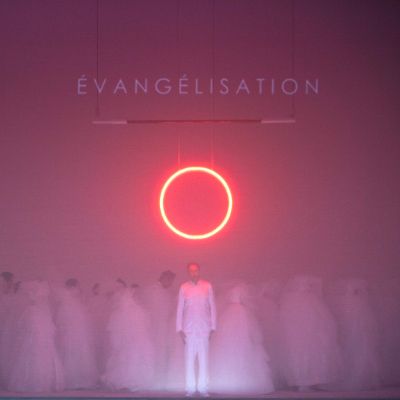| Opéra national de Paris | ||
| Philippe Jordan | Conductor | |
| Romeo Castellucci | Director, Set Designer, Costume Designer, Lighting Designer | |
| Orchestre de l'Opéra national de Paris | ||
| Chœurs de l'Opéra national de Paris | ||
| Christian Longchamp | Dramaturgy | |
| Piersandra Di Matteo | Dramaturgy | |
| Cindy Van Acker | Choreography | |
| Maîtrise des Hauts-de-Seine | ||
| Chœur d'enfants de l'Opéra National de Paris | ||
| Jose Luis Basso | Choirmaster / chorus director | |
| Thomas Johannes Mayer | Baritone | Moses |
| John Graham-Hall | Tenor | Aron |
| Julie Davies | Soprano | Young Maiden, First Naked Virgin |
| Catherine Wyn-Rogers | Mezzo-soprano | Sick woman |
| Nicky Spence | Tenor | Young Man |
| Chae Wook Lim | Bass | Another Man |
| Christopher Purves | Baritone | Ephraimite |
| Ralf Lukas | Bass | Priest |
| Maren Favela | Soprano | Second Naked Virgin |
| Valentina Kutzarova | Mezzo-soprano | Third Naked Virgin |
| Elena Suvorova | Contralto | Fourth Naked Virgin |
"Unimaginable, because invisible, because immeasurable, because infinite, because eternal, because omnipresent, because almighty."
- Moses und Aron, Act I, scene 2
“I have at last learned the lesson forced on me last year, and I shall not forget it. I am neither a German nor a European, and perhaps barely human, but I am a Jew.”
Despite having converted to Protestantism in his youth, Schönberg was the target of anti-Semitic attacks from 1921 onwards. Shaken by such virulence, he decided to return to his roots while developing a highly personalised interpretation of the Old Testament.
What initially started out as a cantata soon took on the dimensions of an oratorio. The project became a philosophical opera that pitted not only two brothers, Moses and Aron, against each other, but also radicalism and compromise, muddled discourse and lyric effusion to the backdrop of a fickle community personified by a particularly massive chorus.
“Oh word, word that I lack!” That last phrase, uttered by Moses, sums up the prophet’s tragic weakness but also expresses the composer’s inability to overcome his own contradictions.
Officially converting back to Judaism in Paris shortly before seeking refuge in the United States, the inventor of dodecaphonism was plagued by an almost existential inability during the last two decades of his life: that of completing Moses und Aron.
Philippe Jordan conducts this masterpiece along with the full musical forces of the Paris Opera and Romeo Castellucci makes his much awaited debut on the stage of the Opera Bastille.
Reviews of Moses and Aron directed by Romeo Castellucci


